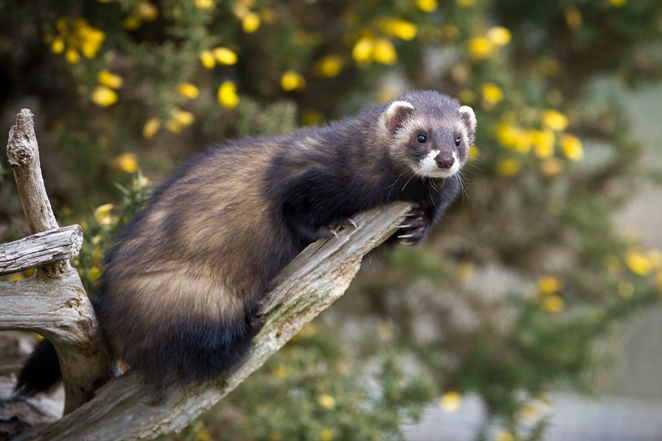Are you tired of using harmful chemicals to keep pests away from your home and garden?
If so, you’re in luck!ferrets can be a great natural solution for pest control.
These sleek and stealthy creatures have a strong predatory instinct and are known to effectively repel pests such as mice, rats, and other small rodents.
We will explore the benefits of using ferrets as natural pest repellents and provide you with practical tips on how to incorporate them into your off-grid lifestyle.
Ferrets are natural predators
Ferrets are carnivores and have a strong prey drive, making them effective at controlling pests that are considered nuisances or threats to off-grid living.
As carnivores, ferrets are well-equipped to hunt and kill small animals that can be detrimental to a self-sufficient lifestyle.
For example, they can be trained to hunt and kill rabbits, rodents, and other pests that can damage crops, gardens, and property.
Ferrets have a strong prey drive, which means they are highly motivated to pursue and catch their prey, making them valuable assets for pest control.
With proper training and care, ferrets can be a valuable addition to any off-grid homestead, helping to protect crops, livestock, and property from harmful pests.
Ferrets can repel rabbits and rodents
Ferrets are known to hunt and kill small rodents, making them a useful tool for repelling rabbits and other rodents that can damage crops or cause other problems on off-grid properties.
Ferrets, despite their cute and cuddly appearance, are formidable predators that can effectively repel rabbits and rodents from off-grid properties.
These sleek and agile creatures are natural hunters, and their keen senses, sharp teeth, and quick reflexes make them well-suited for taking down small rodents that can damage crops or cause other problems.
When ferrets are introduced into an area where rabbits or rodents are present, they will immediately begin hunting and killing these pests, providing a natural and effective solution for pest control.
In addition to their hunting skills, ferrets also possess a strong instinct to burrow and explore, which can be beneficial for off-grid properties with underground pest problems.
By allowing ferrets to roam freely around the property, they can easily locate and eliminate any rodents that are hiding in underground burrows or tunnels.
Overall, ferrets can be a valuable addition to off-grid properties looking to repel rabbits and rodents.
Their hunting skills, coupled with their natural burrowing instincts, make them an effective and natural solution for pest control.
By introducing ferrets into the area, property owners can enjoy a safer and healthier environment for their crops and other animals.
Ferrets can help control cockroaches and other insects
While ferrets are primarily known for their ability to control rodents, they can also help control cockroaches and other unwanted insects.
Ferrets are highly skilled hunters, and their natural instinct to chase and catch prey can be leveraged to control cockroaches and other unwanted insects.
When released into a cockroach-infested area, ferrets will eagerly pursue and catch these pests, significantly reducing their populations.
Moreover, ferrets have a strong sense of smell, which allows them to detect and locate cockroaches and other insects with ease.
This makes them an effective solution for eliminating these pests from homes, gardens, and other spaces.
Ferrets are agile and can access tight spaces, making them particularly useful for controlling cockroaches that have infested hard-to-reach areas.
By introducing ferrets into an infested area, you can rely on their natural hunting instincts to effectively control cockroaches and other unwanted insects.
Ferrets are low-maintenance
Ferrets require minimal upkeep and can thrive in small spaces, making them a practical choice for off-grid living where resources may be limited.
Ferrets are a low-maintenance companion animal that can thrive in small spaces, making them an ideal choice for off-grid living.
Unlike dogs or cats, ferrets require minimal upkeep and can adapt to a variety of living conditions.
They are clean animals and will keep their living area tidy, requiring only occasional cleaning and disinfecting.
Ferrets are low-noise animals and won’t disturb the peaceful ambiance of an off-grid community.
They are also relatively low-cost pets, requiring only basic supplies such as food, water, and shelter.
Perhaps most importantly, ferrets can thrive in small spaces and can be kept in a spacious cage or enclosure, making them an excellent choice for off-grid living where resources may be limited.
Overall, ferrets are a practical and low-maintenance companion animal for off-grid living.
Ferrets can be litter trained
With proper training and care, ferrets can be taught to use a litter box, making them easier to keep in off-grid homes where waste disposal may be more challenging.
Litter training ferrets is a feasible and rewarding option for off-grid homeowners who wish to keep these playful and affectionate animals.
With proper training and care, ferrets can be taught to use a litter box, eliminating the need for waste disposal in unconventional areas.
The first step in litter training is to introduce the ferrets to the litter box soon after they arrive at their new home.
This can be done by placing them in the box after meals or playtime to create a positive association.
It’s essential to choose a litter that is safe and pleasant for the ferrets to use, as they have a sensitive sense of smell.
Some suitable litters include clay, silica, or recycled paper products.
Once the ferrets are comfortable with the litter box, it’s important to maintain a regular cleaning schedule to prevent bacterial growth and odors.
This includes daily cleaning of the box and replacing the litter completely every week or two.
With consistent training and care, ferrets can learn to use a litter box in no time, making them a wonderful addition to any off-grid home.
Ferrets are relatively quiet
Compared to other pets, ferrets are relatively quiet, which can be an advantage for off-grid living where noise can be more easily heard and may be more disruptive.
One of the underrated benefits of owning a ferret as a pet is their relatively quiet nature.
Unlike other pets, such as dogs and cats, ferrets are not known for their barking or meowing, which can be a significant advantage for those living off-grid.
In remote areas, noise can travel further and be more easily heard, and it can be more disruptive to the peaceful ambiance of off-grid living.
Ferrets, on the other hand, are quiet creatures that will not disturb the serenity of your surroundings.
They make occasional high-pitched sounds, but these are far from intrusive and will not draw attention to your home.
Ferrets are crepuscular, meaning they are most active at dawn and dusk, which coincides with the quieter hours of the day.
As a result, ferrets are an excellent choice for off-grid living, providing a low-maintenance and quiet companionship that will not disrupt your peaceful off-grid lifestyle.
Ferrets have a short lifespan
Ferrets typically live for around 7-9 years, which means they can be a more short-term solution for pest control compared to other pets.
Ferrets are known for their playful and affectionate nature, but their lifespan is relatively short compared to other popular pets.
On average, ferrets live for around 7-9 years, with some individuals living up to 12 years in ideal conditions.
While this may seem like a long time, it’s important to remember that ferrets are a more short-term solution for pest control compared to other pets.
For example, dogs and cats can live for 15-20 years or more, making them a longer-term investment for pest control.
However, ferrets are ideal for small infestations or for those who don’t want to commit to a longer-lived pet.
With proper care and attention, ferrets can be a valuable addition to your pest control strategy, providing effective and entertaining pest control for many years.
Ferrets are social animals
Ferrets are highly social creatures that thrive in the company of humans and other ferrets, which can make them enjoyable companions on off-grid properties.
Ferrets are indeed social animals that flourish in the presence of human interaction and the companionship of other ferrets.
This means that if you’re looking for a unique and engaging companion on your off-grid property, a ferret might be just the thing you need!
These curious and playful creatures are known to form strong bonds with their human caregivers and can even become quite affectionate, provided they receive proper care and attention.
When kept in pairs or small groups, ferrets can entertain each other and provide a sense of community and social interaction that can be beneficial for both the animals and their human families.
Plus, with proper training and enrichment, ferrets can be easily toilet-trained and can learn to interact with their environment in fun and creative ways.
All in all, ferrets can make wonderful and entertaining companions on off-grid properties, especially if you’re looking for a low-maintenance but lovable addition to your family.
Want More? Dive Deeper Here!
Hey there! If you’re the type who loves going down the rabbit hole of information (like we do), you’re in the right spot. We’ve pulled together some cool reads and resources that dive a bit deeper into the stuff we chat about on our site. Whether you’re just killing time or super into the topic, these picks might just be what you’re looking for. Happy reading!






